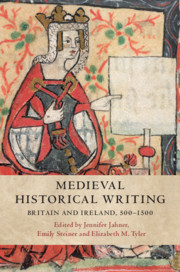Book contents
- Medieval Historical Writing
- Medieval Historical Writing
- Copyright page
- Contents
- Illustrations
- Notes on Contributors
- Abbreviations
- General Introduction
- Part I Time
- Part II Place
- Part III Practice
- Part IV Genre
- Chapter 22 Chronicle and Romance
- Chapter 23 Forgery as Historiography
- Chapter 24 Hagiography
- Chapter 25 Writing in the Tragic Mode
- Chapter 26 Crisis and Nation in Fourteenth-Century English Chronicles
- Chapter 27 Polemical History and the Wars of the Roses
- Bibliography
- Index
Chapter 24 - Hagiography
from Part IV - Genre
Published online by Cambridge University Press: 19 December 2019
- Medieval Historical Writing
- Medieval Historical Writing
- Copyright page
- Contents
- Illustrations
- Notes on Contributors
- Abbreviations
- General Introduction
- Part I Time
- Part II Place
- Part III Practice
- Part IV Genre
- Chapter 22 Chronicle and Romance
- Chapter 23 Forgery as Historiography
- Chapter 24 Hagiography
- Chapter 25 Writing in the Tragic Mode
- Chapter 26 Crisis and Nation in Fourteenth-Century English Chronicles
- Chapter 27 Polemical History and the Wars of the Roses
- Bibliography
- Index
Summary
From modern perspectives, hagiography is the antithesis, not a sub-species, of historiography: legend and history are distinguished from each other categorically by their truth value. A different relationship obtained between hagiography and history-writing in the premodern period, however, as is witnessed by the term “legend”: while it now identifies a story precisely in terms of its failure to meet standards of historical veracity, in the Middle Ages it identified saints’ Lives as legenda: that which should be read. This chapter explores hagiography as a form of historiography, one that—as an exceptional or limit case—can help us understand how history and history-writing were conceptualized in the Middle Ages, and how they might most usefully be conceptualized in scholarship on the Middle Ages. To this end, the chapter surveys Latin and vernacular hagiography from the early eighth century to the end of the Middle Ages, attending to its narrative forms, its truth claims, its institutional affiliations, its contribution to regional and national histories, and its relation to other genres.
Keywords
- Type
- Chapter
- Information
- Medieval Historical WritingBritain and Ireland, 500–1500, pp. 420 - 436Publisher: Cambridge University PressPrint publication year: 2019
- 4
- Cited by

